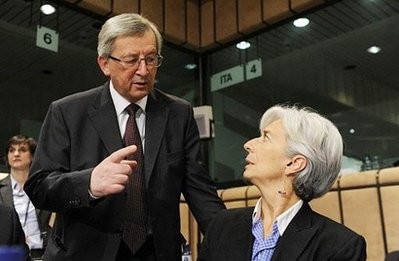The newly-returned head of the eurozone vowed on Monday to revamp its economic governance as market pressure triggered by ballooning Greek debt spiralled.
Fresh from being re-elected to represent the economic interests of the 16 countries that share the decade-old currency, Luxembourg premier Jean-Claude Juncker spelled out four key changes he wants to implement.
"We will need to concentrate our efforts on structural politics... linked to respective competitiveness of member states throughout the eurozone," he warned in reference to huge imbalances in economic productivity brought sharply into focus during the recession.
"It's not a question of adding bureaucratic layers, but of adding value to our economy," Juncker told his closing press conference.

The changes involve: budgetary coordination, with tightened rules sought on adherence to bloc rules on deficits and other economic indicators; greater surveillance in order to gradually even out imbalances; international representation for the eurozone in the Group of 20 major economies in particular; and a more rigorous examination of candidates to enter the currency zone.
With recession having laid bare massive discrepancies between national eurozone economies, Juncker's in-tray is arguably busier than at any time since he first took the grouping's reins in 2005, 10 years after taking power at home.
Juncker, doyen of European leaders, back at Eurogroup helm
Seemingly impenetrable deficit problems in Athens have left markets asking tough questions of the eurozone's prospects, as summed up neatly earlier on Monday by Simon Derrick, an analyst at BNY Mellon.
"With rising concerns about the workability of the Greek government's stability and growth plan, the firm rejection from within the eurozone of the idea of a bailout, the rapidly rising cost of default insurance on Greek sovereign debt and concerns over deficits elsewhere in the region... the problems for the single currency are mounting rapidly," he said.
"I can understand why the markets aren't convinced yet," Dutch Finance Minister Wouter Bos admitted going into the meeting.
"We should enable the Greeks to show the markets that they know what they're doing... that it's not just going to be beautiful words."
Ireland, Portugal and Spain should also be encouraged "to show that they are aware of their own responsibilities to get their finances in order," Bos warned as cracks began to appear among peers.
However, after hearing the latest from Athens, Juncker insisted that Greece is in a uniquely bad way.
Analysts have speculated that Greece might need a European Union or International Monetary Fund bailout, with the cost of borrowing money having skyrocketed and some even suggesting that eurozone exclusion lies ahead.
All told, the result is clearly a more cautious approach to euro area enlargement, with Juncker adding that member states wanting in "have to realise that the journey can be stressful, there have to be long-term efforts."
Juncker's policy progress may not move as rapidly as he wishes, with Franco-Spanish move to promote such stronger central economic governance opposed by Germany, which fears for the independence of the European Central Bank in Frankfurt. A decision on who will be the European Central Bank's next deputy governor was, meanwhile, put back until next month.
EU ministers are due on Tuesday morning to discuss an overhaul of bloc savings tax rules, with pressure growing on Juncker's Luxembourg to drop its long-cherished banking secrecy laws.
























